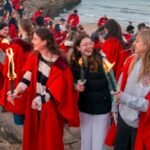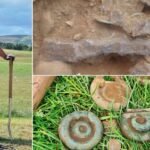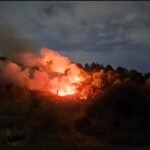The Hebridean Book Festival, Faclan, explores the theme of “Lost” in its 2023 edition, featuring a range of authors, artists and speakers who share their stories and insights on the natural world, the arts, the past and the present.
How to Define Lost?
The concept of lost is not as simple as it seems. It can have different meanings depending on the context and the perspective. Is something lost if we know where it is, but cannot reach it? Is something lost if we no longer possess it, but still value it? Is something lost if it has changed beyond recognition, but still exists in some form?
These are some of the questions that the festival’s director Roddy Murray poses in his introduction to the event, which runs from 18 to 21 October at An Lanntair, Stornoway. He invites the audience to explore the theme of lost through various lenses, such as language, culture, history, geography and identity.
Rediscovering the Lost Names and Places of Lewis
One of the highlights of the festival is a talk by Murdo “Stal” Macdonald, Mairi Gillies and Rusty Macdonald, who have excavated the “Tomb of Language” to recover the names of humble hillocks, water-courses, desolate cleared villages and other features of the landscape that were once known and used by local people. These names are not found on any map, but only in the memory and oral tradition of the community. They reveal a rich and intimate relationship between people and place, as well as a sense of loss and nostalgia for a way of life that has largely disappeared.

Orwell’s Island and the Birth of Big Brother
Another fascinating talk is by Les Wilson, who takes us to Jura, the remote island where George Orwell wrote his dystopian masterpiece Nineteen Eighty-Four between 1946 and 1949. Wilson explores how Orwell’s experience of living in a secluded farmhouse influenced his vision of a totalitarian society where Big Brother, Newspeak, the Thought Police and Room 101 are omnipresent. He also examines how Orwell’s novel resonates with our current reality of surveillance, propaganda and manipulation.
Fire-stacks: A Transient Art Form
Julie Brook is an artist who creates fire-stacks: small castles made of stones and lit by fire that are built and rebuilt on tidal platforms in remote locations. She spent several years living in a sea-arch on Jura, where she developed this unique art form that challenges the notions of permanence and impermanence. Her fire-stacks are monuments to the moment, defiant and incandescent fortresses that are extinguished and drowned by each tide. They are as ephemeral as a sandcastle on a summer beach, but they also leave a lasting impression on the viewer’s imagination.
The Longstone: A Timeless Witness
Christopher Morris is a filmmaker who spent a year filming a single shot of a 4,000-year-old monolith in Cornwall. His film A Year in A Field is a mesmerising meditation on time, nature and human presence. The Longstone stands still as everything around it changes: seasons, weather, light, shadows, animals, plants. It evokes a sense of mystery and wonder about its origin and purpose. It also reminds us of our own mortality and insignificance in the grand scheme of things.
Other Events Not to Be Missed
The festival also features other events that explore various aspects of the theme of lost, such as:
- Alex Boyd’s photographs that capture the hidden history and beauty of the Celtic world using ancient techniques.
- Ian Stephen and Colin Tucker’s passion for the sea, islands and maritime history.
- Susanne Barding’s account of living in Berneray in the early 1970s, before it was connected to North Uist by a causeway.
- Ian R Thomson’s memoir of being an isolation shepherd in Glen Strathfarrar before it was flooded by a hydro-electric scheme.
- Mike Billett’s analysis of how peat influences the flavour of whisky.
- Douglas Stuart’s novels Shuggie Bain and Young Mungo that portray his personal journey from poverty and adversity to success and self-discovery.

















